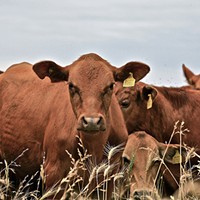You may or may not realize this, but when you bite into a big, juicy hamburger, you're getting much more than you bargained for ... especially if your burger came from a restaurant chain or a typical grocery store. Unless it's labeled "organic" or "grass-fed," chances are your burger contains antibiotics, hormones, steroids and more.
While none of those ingredients are appetizing, antibiotics are particularly harmful to your health. According to the Centers for Disease Control and Prevention, antibiotics "have been used so widely and for so long that the infectious organisms the antibiotics are designed to kill have adapted to them, making the drugs less effective."
You see, bacteria evolve faster than we do; so, they not only become accustomed to the drugs — they get stronger, leading to antibiotic-resistant strains of diseases like pneumonia, tuberculosis and Methicillin-resistant Staphylococcus aureus (MRSA) to name a few. In fact, the World Health Organization calls the consequences of antibiotic resistance "severe," adding it can lead to longer-duration, more severe illnesses and even death.
Fortunately, an easy way to avoid overdosing on antibiotics is to stop eating the foods that contain them. That's where farmers like Art Duckworth come in. He's the owner of Apple Orchard Farm, which is located just outside of Charlotte's city limits. His cattle mostly eat grass, which is why he likes to think of himself as a grass farmer as much as anything else. "You get good meat from good cattle, and good cattle from good grasses," says Duckworth, who sells his beef at the Mount Holly Farmer's Market.
While his cattle roam around in grassy pastures, fattening up at a natural rate, not all cows are so lucky. Large-scale industrial farmers, like those that supply many chain restaurants and grocery stores, tend to have many times more cattle and less space for them individually, which means more opportunities for cattle to get sick.
Duckworth says, "Our focus has always been on quality, not quantity," but he realizes that industrial farmers are focused on the opposite, fattening their livestock as fast as possible so they can sell the meat as quickly as possible. Antibiotics, hormones and steroids — often included in the animals' food — help the farmers with that quest.
Hormones and steroids make the animals grow fast; antibiotics, on the other hand, are intended to prevent disease in the tight quarters often found on factory farms. But, after roughly 60 years of dosing the herd, it's no longer an effective practice — since the same resistant super bugs that make us sick can make them sick, too.
That's why it's important to take some time and get to know what's going into your food. One way to do that is to meet your farmers and ask them what they feed their animals. Not sure how to find the farmer nearest you? Check out Eatwild.com for a list of local farmers raising grass-fed, organic beef.

